Gunmen identified as “bandits” by Nigerian officials kidnapped over 100 people from four northeastern villages on Sunday, possibly for ransom or use as human shields against Nigerian military operations.
“Right now Kanwa village is deserted, the bandits divided themselves into two groups and attacked the community. They kidnapped children aged between 14 to 16 years and women,” a terrified anonymous resident of one village told Voice of America News (VOA) on Monday.
VOA reported groups of 30 to 40 people were kidnapped from each village, some of them taken while working on their farms.
Ibrahim Dosara, information commissioner for the Zamfara region, suggested the gunmen might want human shields to fend off a government military assault.
Ransom is also a distinct possibility, as it became one of the most lucrative industries in Nigeria after Boko Haram scored a secret $3.7-million ransom payment for some victims of the infamous 2014 Chibok schoolgirl kidnapping (over 100 of the 276 abducted girls remain missing to this day),

In this photo released by the Nigeria State House, Nigeria President, Muhammadu Buhari, centre, meets with Chibok school girls recently freed from Nigeria Extremist captivity in Abuja, Nigeria, Sunday, May 7, 2017. (Bayo Omoboriowo/Nigeria State House via AP)
Several other mass kidnappings have reportedly been settled with big ransom payments from the embarrassed Nigerian government. Following a great deal of international controversy about the clear incentives for abduction created by these payments, the Nigerian Senate passed a bill in April 2022 imposing a 15-year jail sentence for paying ransom, and life imprisonment or execution for kidnapping.
Some Nigerians opposed the tough anti-kidnapping law because they feared paying ransom was the only way to get their loved ones back alive, capital punishment for kidnappers would give them more reason to kill their victims, and the government was grandstanding with newsy legislation instead of actually doing something about the “bandits.”
“If I have what to do to get my children out and I refuse to do because somebody is threatening arrest, it is better I do it, let my children come out and be under the roof of their father, let the government arrest me, then we’ll meet in court,” the father of one kidnapping victim told Voice of America News (VOA) in July.
Al Jazeera News in April quoted analysts who counted $18.34 million in ransom payments paid by families and the government from 2011 to 2020. Bandit gangs staged five mass kidnappings with over 760 total victims in the first few months of 2021.
Nigerian officials worry that ransom payments are being spent on weapons by the bandit gangs, many of which are linked to jihadi groups like Boko Haram, rather than being freelance non-ideological thieves. One of the leaders of the Chibok kidnapping operation said in a July 2022 interview that most of the ransom income is spent on weapons and equipment for future operations.
A fresh wave of mass kidnappings broke out in 2022, including a March outrage in which bandits blew up railroad tracks and kidnapped over 160 people from a train. Raids on villages in which dozens of people are marched back to the kidnappers’ lairs in the wilderness have become common. Schools are also popular targets; UNICEF warned in 2021 that kidnappings might cause the education system in northern Nigeria to collapse.
While the Nigerian government continues to debate the anti-ransom bill, it also tried to inconvenience bandits in October by redesigning the naira note, theoretically making it difficult for kidnappers to spend their hoard of ill-gotten cash because the old bills were no longer accepted. Critics said this move would simply inspire kidnappers to demand their ransom payments in U.S. dollars.

COMMENTS
Please let us know if you're having issues with commenting.